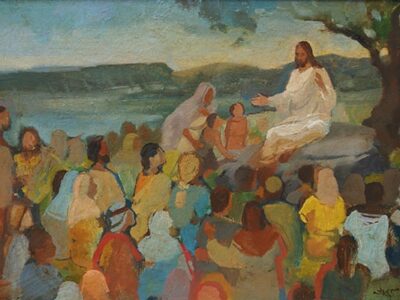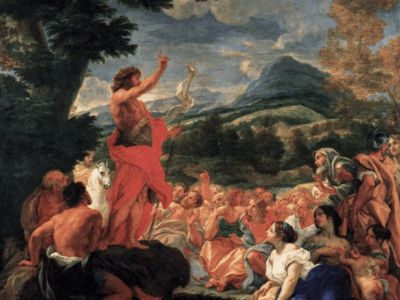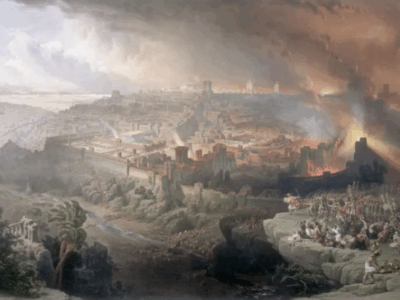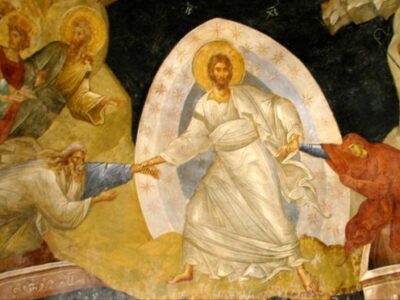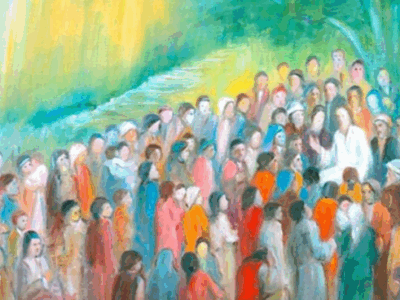
Internal Plumb Lines
Year B
Amos 7:7-15
Psalm 85:8-13
Ephesians 1:3-14
Mark 6:14-29
May the words of my mouth O God… speak your truth…
Of the four prophetic books that date back to about the eighth century… Hosea… Isaiah… Joel… and Amos… Amos is probably the oldest… and his words are so startling and dramatic… that they’re virtually unprecedented… but all Amos is doing… is reporting God’s use of a plumb line… normally… a plumb line just uses gravity to assess whether a wall stands true… this wall stands for Israel… and the plumb line represents God’s standards of judgment… which include moral rectitude… truth… and justice… but the line reveals that Israel is not plumb… it is crooked… unjust… unrighteous… and corrupt…
Amos is simply responding to the traditions that he and his hearers already held in common… that God brought them out of Egypt and gave them the land of Canaan… and that the people always knew that God expected them to be righteous and just… but they have ended up being responsible for so much religious arrogance and social injustice… that the land itself… the very land itself… was unable to bear the weight of God’s words of judgment…
On the human level… Amos’ words were considered treasonous… because he prophesied against King Jeroboam… a king during the time of a divided monarchy… because in the north… there was the Kingdom of Israel… and in the south… the Kingdom of Judah… Judah… where Jerusalem and the Temple were… and early on… God said that only worship and sacrifice in the Jerusalem Temple would be acceptable… ] so here’s Jeroboam with two sanctuaries in what was called the high places… one in Bethel… and one in Dan…
And Amos ended up having to defend himself… saying… I’m no professional prophet… I’m just a herdsmen… the Lord took me from my flock… took me from what I know and do… and told me to say these things… his innocence and reluctance only made his message more credible… and about forty years later… the Kingdom of Israel came to an end…
While I was growing up… and when we celebrated Passover… we sang a song called Dayanu… it recounted the things God had done for us… there are five stanzas about leaving slavery… five about miracles… and five about being with God… and after each stanza… the singers proclaim Dayanu… it would have been enough… ] if God had only done that first thing… that would have been enough… or just the first two… those would have been enough… or just the next and the next and the next… if at every point God had done NO more… it would have been enough… because each stanza contains deep appreciation for each thing God has done…
When Paul wrote Ephesians… he didn’t have this song to go by… it’s only about one-thousand years old… but Paul too recounts all the things God has done for us… blessed us in Christ… chose us before the foundation of the world… destined us for adoption… forgave our trespasses… made the mystery of his will known to us… gave us an inheritance… marked us with the seal of the Holy Spirit… and redeemed us through his blood… and because of how the Ephesians received the Gospel… they are experiencing a radical transformation of their personal and social identity… they are being formed for humility and social justice… into God’s purposes… and into God’s family…
This morning we have a story about King Herod and John the Baptist… John had been like Amos… he spoke out against religious arrogance and social injustice… Herod had no right to marry his sister-in-law while her husband was still alive… and on one level Herod knew it… and he knew that John was a holy man… and he liked to listen to him… but was perplexed by him too…
But Herod’s wife Herodias held a grudge against John… she feared that if Herod listened to John… and took what he said to heart… that she’d end up as a divorced woman out on the street… shamed out of the lap of luxury… ] clearly she’d benefit from silencing John… and Herod may even have put John in prison to protect him…
So here’s show-off Herod… at a lavish birthday feast he throws for himself… and all the friends he wants to impress are there… and Herodias’ daughter… known as both Herodias and Salome… so impresses Herod with her dancing… that he tells her she can have whatever she wants… up to half of his kingdom…
The older Herodias tells her daughter to ask for John’s head… it’s the younger one who adds “on a platter”… and Herod ends up between a rock and a hard place… it’s not difficult to imagine the struggle Herod had inside… Herod knew that John was a righteous and holy man… but because of his audacious promise… he also didn’t want to lose face in front of his guests… and so rather than acknowledge that his offer was just too much… he chooses to have John murdered…
Mark sandwiches this story about Herod… between stories about the disciples being sent out… and stories about them coming back… and he may do this as a way of helping us understand that discipleship comes at a price… as a way of teaching us… that weak people kill… and while strong people suffer at their hands… they generally don’t retaliate… that those who follow Jesus are strengthened by faith and may be less afraid to die… they may even preach repentance to political and religious leaders…
And like Herod… there are people at the top… who because of their emotional or spiritual immaturity… harm others to protect their lavish lifestyles… they like listening to holy men… they may have sat through a thousand sermons… but think that repentance and conversion are signs of weakness… they have not converted from ego to soul… from self-love to love of others… they’re so attached to their social image that they can become desperate when it’s threatened… and in whatever form it takes… the heads of others are a small price to pay to maintain their illusions…
Professor Matt Skinner from Luther Seminary… writes… the Bible includes a number of tales that take us inside the courtrooms of immoral… unprincipled… and self-absorbed leaders… however… there is no Esther or Daniel in this one… there is no one who can serve as a circuit breaker… to prevent the ruler’s stupidity from becoming deadly… . nor is there a humorous element that allows the story to function as satire… ] this is simply a depiction of noxious people… with little impulse control… who hold positions of power… ] and Prof. Skinner reminds us… that opposition to the reign of God takes a toll… and has lasting consequences… but that opposition never has the last word…
We know that this temporal world is not permanent… but we do not resist this impermanence by digging in arrogant heels… one theologian wrote: We will only know how to correctly save our life in this world… if we convert and value the eternal world… we must move beyond listening and not acting… no one knows what the future holds… events are conspiring… to bring us into situations where the only way to move justly and honestly forward… will be to access the resources of conversion…
We don’t always have the power to rein in the destructive potential of self-obsessed rulers… toxic values… or an unwillingness to listen to truth… but Herod Antipas and his household remind us… that the voices of innocent people are far too often silenced… and they suffer when we don’t use the power and the free will that’s available to us… and so we may ask… what do our internal plumb lines reveal… does the pull of God’s gravity… of God’s values… show us to be in or out of alignment with them… and is there anything… or anyone… or any group of people… who we’re willing to sacrifice… in order to protect our status quo…

